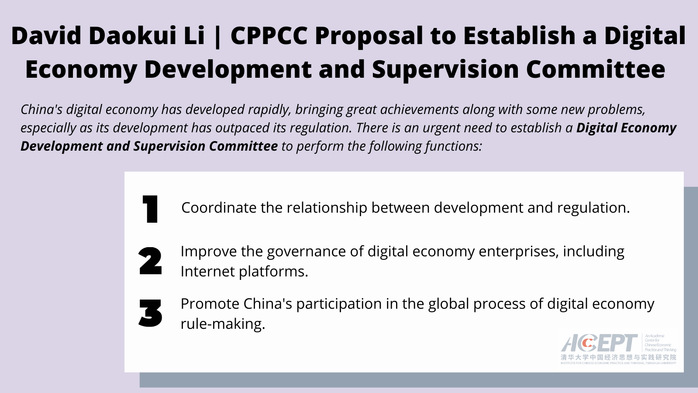David Li | CPPCC Proposal for the Establishment of a Digital Economy Development and Supervision Committee
Originally published in Chinese by ACCEPT on March 6, 2021. Translated by ACCEPT.
Chinese version: http://www.accept.tsinghua.edu.cn/2021/0306/c69a815/page.htm

During the 2021 Two Sessions, David Daokui Li, a member of the CPPCC Standing Committee and director of the Academic Center for Chinese Economic Practice and Thinking (ACCEPT) at Tsinghua University, pointed out in his proposal that the Central Economic Work Conference in 2020 emphasized the need to “strengthen anti-monopoly measures and prevent the disorderly expansion of capital.” To this end, there is an urgent need to establish a system that can promote the long-term healthy development and reasonable regulation of digital industries.
Professor Li explained that since the beginning of the new century, the digitization and informatization of China's economy has accelerated significantly. According to the “Digital Economy Development in China” 2020 white paper by the China Academy of Information and Communications Technology, the digital economy already accounts for 36% of GDP. Not only has it become an important driving force for economic transformation and upgrading, but it has allowed China to stand out as a leader in many fields. The digital economy is expected to become an important breakthrough for the Chinese economy, helping to build an innovative country and allow for the continuous improvement of international competitiveness.
According to David Daokui Li’s analysis, the current development of China's digital economy demonstrates the following three characteristics. First, some of China’s digital economy enterprises are at the forefront of the world—a highlight of China's economic innovation. For example, in the fields of online shopping, mobile payment, and second-hand housing transactions, Chinese enterprises have clearly taken the lead. They have had a positive impact on the transformation and upgrading of traditional industries, especially for many small- and medium-sized enterprises. Second, most digital industries are still in a state of intense competition. Their industrial structures are rapidly evolving, and on the whole, a monopoly pattern has not yet formed in the traditional sense. At present, China's digital industries are developing quickly, the market is complex and changing, and new enterprises, new models, and new technologies are constantly emerging. In this context, even giant Internet platforms can hardly maintain their absolute advantage in the long-term—they face the risk of losing their status at any time. Third, China's digital industries have essentially been developed in a regulatory vacuum for a long time.Thus, when there is a controversial event, the relevant regulatory emergency response mechanism is mostly based on experience with traditional industries, leading to inaccurate assessments and even excessive responses to new issues.
In 2020, the Central Economic Work Conference emphasized the need to “strengthen anti-monopoly measures and prevent the disorderly expansion of capital.” How can we implement this national strategy and promote the long-term healthy development of Internet industries and the digital economy? To this end, there is an urgent need to establish a system that can promote the healthy development and reasonable regulation of the digital industries.
In pursuit of this goal, Professor Li proposed the establishment of a Digital Economy Development and Supervision Committee under the unified leadership of the State Council to be specifically responsible for promoting the long-term healthy development of the digital economy, including Internet platforms.
The establishment of the Digital Economy Development and Supervision Committee can play the following three roles. First, it can coordinate the relationship between development and regulation. For a long time, research and regulation of China's digital economy have lagged behind the development of digital industries. Although various agencies, including the State Administration of Market Regulation, have recently strengthened the management of Internet enterprises, the focus of these agencies has been on regulation rather than development. The establishment of the Digital Economy Development and Supervision Committee will allow for the effective coordination of the relationship between development and regulation, thus promoting the long-term healthy development of industries within the digital economy. Second, it can improve the governance of digital economy enterprises, including Internet platforms. Unlike traditional industries, the regulation of digital economy enterprises, including Internet platform companies, has a strong sense of professionalism, which puts higher requirements on the governance capacity of regulators. The Digital Economy Development and Supervision Committee can organize experts, scholars, and industry insiders in related fields to track and study the basic laws of digital economic development in the long-term. They can research how to address the problems that occur within the process of digital economic development and provide suggestions to the National People's Congress and the State Council for the formulation of relevant laws and regulations. Third, it can promote China’s participation in the global process of digital economy rule-making. The new Committee can strengthen communication and coordination with relevant foreign institutions, lead the process of digital economy rule-making and regulatory innovation on a global scale, and use this opportunity to expand the depth and breadth of China’s participation in global governance.
In conclusion, after more than two decades of rapid development, China's digital economy has brought great achievements along with some new problems. David Daokui Li suggests balancing the relationship between development and regulation through the establishment of a Digital Economy Development and Supervision Committee to promote the long-term healthy development of the digital economy, cultivate new momentum for China's economic upgrading and development, and work toward achieving the second centenary goal.




